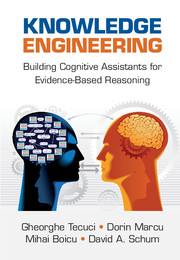Book contents
- Frontmatter
- Contents
- Preface
- Acknowledgments
- About the Authors
- 1 Introduction
- 2 Evidence-based Reasoning: Connecting the Dots
- 3 Methodologies and Tools for Agent Design and Development
- 4 Modeling the Problem-Solving Process
- 5 Ontologies
- 6 Ontology Design and Development
- 7 Reasoning with Ontologies and Rules
- 8 Learning for Knowledge-based Agents
- 9 Rule Learning
- 10 Rule Refinement
- 11 Abstraction of Reasoning
- 12 Disciple Agents
- 13 Design Principles for Cognitive Assistants
- References
- Appendixes
- Index
12 - Disciple Agents
Published online by Cambridge University Press: 05 September 2016
- Frontmatter
- Contents
- Preface
- Acknowledgments
- About the Authors
- 1 Introduction
- 2 Evidence-based Reasoning: Connecting the Dots
- 3 Methodologies and Tools for Agent Design and Development
- 4 Modeling the Problem-Solving Process
- 5 Ontologies
- 6 Ontology Design and Development
- 7 Reasoning with Ontologies and Rules
- 8 Learning for Knowledge-based Agents
- 9 Rule Learning
- 10 Rule Refinement
- 11 Abstraction of Reasoning
- 12 Disciple Agents
- 13 Design Principles for Cognitive Assistants
- References
- Appendixes
- Index
Summary
INTRODUCTION
The agent building theory, methodology and tool presented in this book evolved over many years, with developments presented in numerous papers and a series of PhD theses (Tecuci, 1988; Dybala, 1996; Hieb, 1996; Keeling, 1998; Boicu 2002; Bowman, 2002; Boicu, 2006; Le, 2008; Marcu, 2009). Although this book has emphasized the development of Disciple agents for evidence-based reasoning applications, the learning agent theory and technology are applicable and have been applied to a wide range of knowledge-intensive tasks, such as those discussed in Section 1.6.2.
A previous book (Tecuci, 1998) presented the status of this work at that time and included descriptions of Disciple agents for designing plans for loudspeaker manufacturing, for assessing students’ higher-order thinking skills in history or in statistics, for configuring computer systems, and for representing a virtual armored company commander in distributed interactive simulations.
More recent Disciple agents and their applications include Disciple-WA, an agent for the development of military engineering plans; Disciple-COA, for the critiquing of military courses of action; Disciple-COG, for military center of gravity determination; Disciple agents representing virtual experts for collaborative emergency response planning; Disciple-LTA, for intelligence analysis; Disciple-FS, for regulatory compliance in financial services industries; Disciple-WB, for assessing the believability of websites; and Disciple agents for modeling the behavior of violent extremists.
The following sections present four of these agents and their applications. While all illustrate the general agent development approach discussed in this book, they differ in some of their capabilities and appearance, each reflecting a different stage or trajectory in the development of the Disciple approach.
DISCIPLE-WA: MILITARY ENGINEERING PLANNING
The Workaround Planning Problem
The workaround planning problem consists of assessing how rapidly and by what method a military unit can reconstitute or bypass damage to a transportation infrastructure, such as a damaged and/or mined bridge, a blocked tunnel, or a cratered road (Cohen et al. 1998; Jones, 1998).
Information
- Type
- Chapter
- Information
- Knowledge EngineeringBuilding Cognitive Assistants for Evidence-based Reasoning, pp. 338 - 425Publisher: Cambridge University PressPrint publication year: 2016
